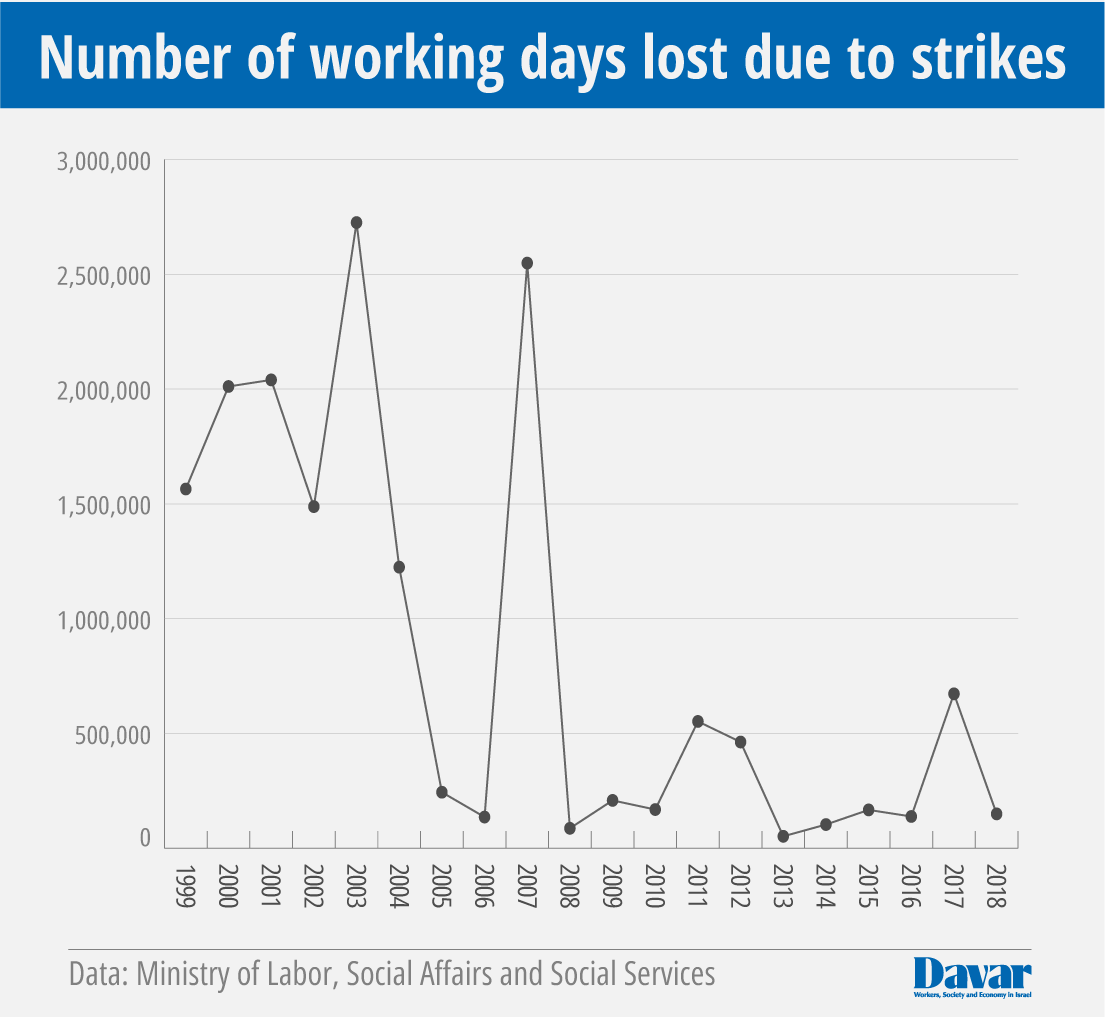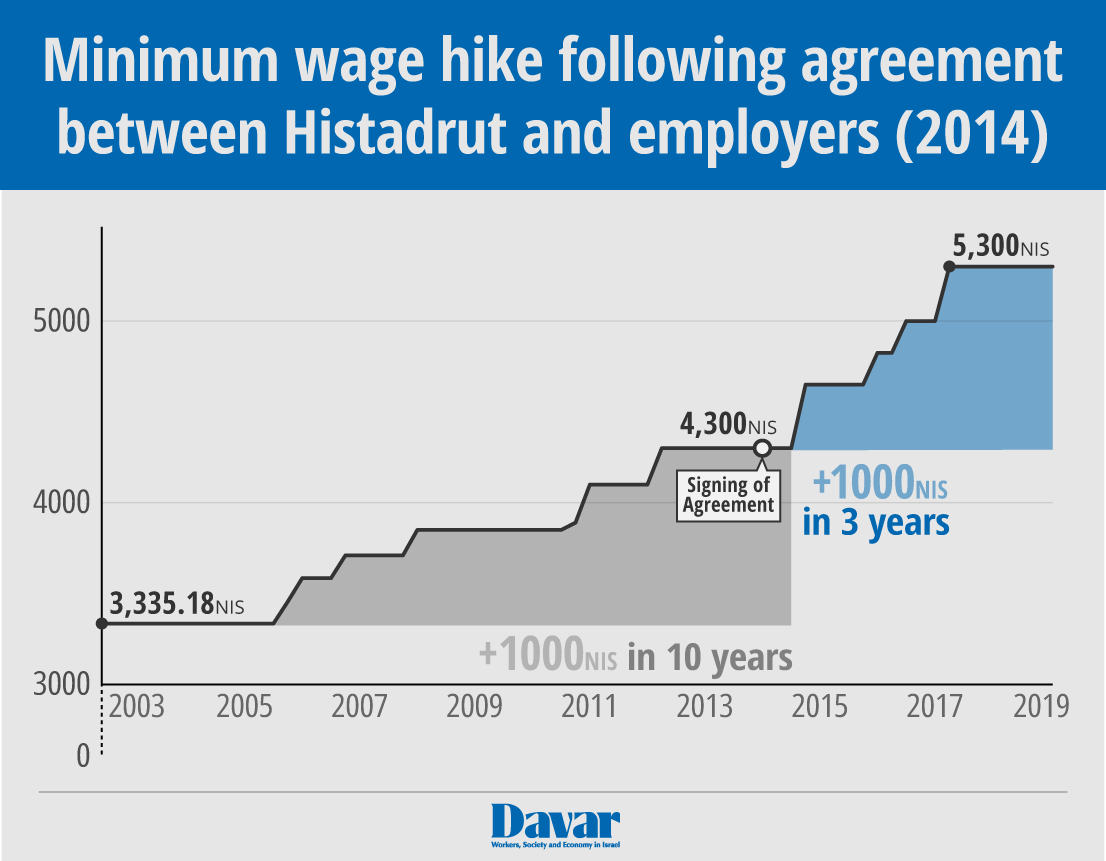
"We are going to begin efforts to raise the minimum wage to NIS 6,000 in the near future, and we need you with us on this issue," said Histadrut chairman Arnon Bar-David, addressing a large crowd of listeners at a conference devoted to the issue of wages and pensions in the industrial sector last month. Surprisingly though, the crowd Bar David was addressing consisted not of union members or workers, but a large group of employers and business owners who had gathered to discuss a plan to raise wages across the labor market.

When it comes to labor relations, Israel is something of an anomaly. On the one hand, Israeli labor unions have made unprecedented progress in recent years, with membership steadily growing at a rate not seen in decades. This growing power has led to a number of achievements which have drawn worldwide attention, and to a reduction in overall levels of inequality – making Israel one of the only Western countries to experience such a trend in recent years, despite a slight rise in 2018.
Yet paradoxically, while the labor movement has been gaining power and influence, strikes have become rarer, falling from an average of two million working days lost in the early 2000's to only 150,000 in 2018. In fact, for the last decade, Israeli unions have been moving away from conflict-based strategies, and have become increasingly reluctant to strike. This is mostly due to the resurgence of a concept that has fallen from grace in the English speaking world, but is gradually gaining traction in Israel: tripartite cooperation, or collaboration between employers, unions and government

Compromise over conflict
The idea of reducing industrial friction and conflict is often seen as serving the interests of employers, but has in fact been a major progressive idea for over a century. What stands behind this approach, known as social corporatism, is the idea that what benefits workers most is a steady, reliable increase in wages, which is best achieved by cooperation between the three major elements of the labor market: the unions, employers and government. In Norway and Sweden, tripartite agreements have been the foundations of the labor market since as early as the 1930s, and much of the system is still intact today through out Scandinavian countries, as well as in Germany.
In Israel, as in most of the English-speaking world, tripartite collaborations formed the basis of the post world war II economy. In the US, during the three decades following the Second World War, round-table discussions consisting of representatives of the unions, employers and government were regularly held to determine wage raises and agree on industrial strategies for the various major industrial sectors. This system, which was based on mutual recognition of the importance of collaboration between the three parties, was responsible for the longest sustained period of rising wages in American history, with inequality levels reaching a historic low. But since the 1980s, the diminishing role of the state and declining influence of labor unions have led to a collapse of the system both in the English-speaking world and in Israel, with each union bargaining separately for wage hikes, usually having to resort to direct action in order to reach an agreement.

Today, the idea is enjoying a slow and gradual revival in Israel. In fact, since 2006, all major agreements regarding market wide labor relations have been negotiated between the unions and representatives of the major Israeli employers – known as the Manufacturers' Association, using no strikes at all. For both sides this is involves a considerable willingness to compromise, which often results in tension and opposition from within the organizations, but union and business leaders have continually backed compromise over conflict.
For over a decade, unions and employer associations have developed a negotiation system that is based on the same round-table principles of the New Deal era. Negotiations are based on a system of compromises, in which each side agrees to certain concessions, and a deal is agreed on by all parties without the need to revert to direct action. As the unions and employers represent the majority of the Israeli labor market, such deals are automatically enacted into law by a legal tool known as an extension order. This allows the Minister of Labor to extend the terms of a single agreement between an employer and its workers and apply it to the labor market as a whole, making it the legal minimum required of all employers in that sector. When an agreement represents the majority of employers and workers in a given sector, the minister is expected to automatically extend the terms, making them legally binding to all employers across the market. This way, unions and employer associations can easily agree on market-wide wage hikes, without the need for unnecessary job actions and strikes, which would otherwise be more frequent. This allowed both sides to reach agreements while avoiding open conflict.

"Thirteen years ago, when this affair began, there were those who said that within a few months it would fall apart," said Shraga Brosh, chairman of the Manufacturer's Association, at the conference. "I'm glad to prove them wrong. At first it was transactional—I made concessions last time, you compromise this time. But very quickly we moved on to another kind of relationship. When one of us tells the other, 'I can't give up on this,' the other guy accepts it and goes looking for another solution."
The Histadrut and the Manufacturer's Association are currently attempting to work together to agree on an increase of the minimum wage to NIS 6,000 a month. If successful, this agreement is expected to legally apply to all employers in Israel, effectively raising the legal minimum wage across the labor market by NIS 700.
Since the mid 2000's, such collaborations have spawned a series of achievements for Israeli unions, with agreements especially benefiting the most vulnerable workers. In 2011, an agreement signed between the Histadrut and the Directorate of Business Organizations, another employers' association, led to an increase in minimum wage from NIS 3,850 to NIS 4,300, despite strong opposition from the government. In 2014, Histadrut and the Business Organizations again signed an agreement that led to an additional increase in the minimum wage from NIS 4,300 in 2014 to NIS 5,300, where it stands today.

This system of collaboration has allowed unions to raise the minimum wage, even in the face of a hostile government. The agreements have often been met with opposition by the government, which has continually warned against raising the minimum wage, claiming that it risks triggering an unemployment crisis. In fact, unemployment in Israel has been falling continuously in recent years, reaching a historic low of 3.4 percent last October. This has been accompanied by a decline in inequality rates, which the Bank of Israel has linked to recent raises of the minimum wage. Despite this, the government has consistently expressed its opposition to raising the minimum wage, and is expected to continue to do so.
In 2016, continuing this system of collaboration, Histadrut and employers agreed to increase the retirement pension contribution to 18.5 percent; an agreement which states that any person, organization or business employing over 100 employees must employ people with disabilities at a rate of at least 3 percent of the total workforce (in public service jobs this was subsequently extended to a legally mandated 5 percent); and an agreement was made to shorten the working week in Israel, alongside previous agreements to raise the minimum wage.

Stronger unions, fewer strikes
The ongoing collaboration has led to a number of unexpected alliances over the years. During the public sector wage crisis in 2007 in which the government had refused to pay full wages to some of its employees, the Histadrut threatened a general strike. The strike was eventually avoided thanks to the employers' association, which intervened on behalf of the unions. "We can often find points to agree on, and mutual interests," said Brosh. "It makes a big difference when there is an established relationship. We all benefit.”
"When we collaborate we basically represent the entire economy," explained Brosh. "All workers and all employers. So the government understands that it has no choice but to get on board. This method has led to a dramatic reduction in the number of strike days, has led to prosperity and achievements, and should continue."






